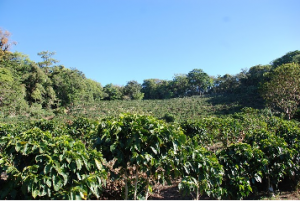Conventional Farming
The dramatic increase in the demand for coffee has had a profound effect on growing methods, as farmers are now being pressured to produce larger and larger quantities of beans. Traditionally, coffee beans have been grown using the shade-grown method, however this generally does not provide enough product to meet market demands. Farmers have since turned to sun-cultivation, a method that promotes rapid bean growth and that is somewhat more efficient. There is little to no canopy cover, and coffee trees are planted at high densities (similar to the way corn and other crops are grown). Despite its efficiency, sun-cultivation methods create a dependence on many environmentally harmful practices.
Deforestation: The necessity for cleared plantations contributes substantially to deforestation. For example, in Latin America, 1.1 million hectares of the 2.8 million hectares used for coffee were converted to sun cultivation. The clearing of these trees has resulted in habitat loss, which is highly detrimental to the extremely biodiverse areas in which coffee is often grown.
Fertilizers: The lack of trees also creates a need for fertilizer use. In a shade-grown environment, dead leaves from the overstory trees provide nutrients (especially nitrogen) to the coffee. However, the lack of trees in sun cultivation generally requires that fertilizers be applied to plants. These fertilizers can have over triple the amount of nitrogen which often ends up running off into local watersheds.
Herbicides/Pesticides: Sun cultivation has also increased the need for herbicides and pesticides. Weeds grow more rampantly when given sunlight, where the dead leaves of shade-grown fields usually act as a natural mulch. The use of pesticides is a common practice in conventional farming, and can also contribute to the contamination of water resources.
Soil quality: The clearing of land for agriculture makes the land more exposed to the elements, which results in topsoil erosion. This can pollute local waterways as sedimentation occurs from eroded topsoil.
Although it is more “efficient,” sun cultivation is not a sustainable practice. Many farmers have turned to organic practices, as they have found there to be more benefits than in conventional farming.
Sources:
http://www.ncausa.org/i4a/pages/index.cfm?pageID=69
http://www.theguardian.com/environment/2011/oct/04/green-coffee

